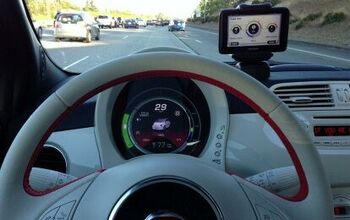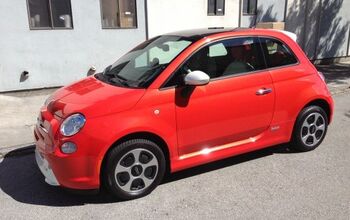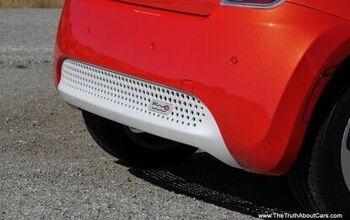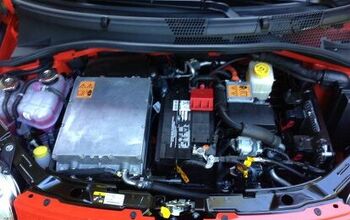Living With an EV for a Week - Day Five

Day five in our week-long look at living with an EV started once again with a full battery. If you’re just checking in, catch up by going to Day 1, Day 2, Day 3, Day 4 before coming back to the saga, I promise we’ll wait for you. Since I’m still afflicted with religion, and because the Episcopal denomination despises change, my Sundays have taken me to the same church, the same building and the same pew for over 33 years. It also means driving 22 miles each way because finding something closer would involve change.
This aversion to change isn’t unique to my religious sect, it’s practically an American virtue. The real impediment to EV proliferation isn’t the range, economy, economics, or availability, it’s change. The average American commutes less than 6 miles in each direction a day. Even with a lunch break where you head home and back to work again we’re talking 24 miles. If you consider the adage of 12,000 miles a year (according to the US census) that expands to a still-manageable 33 miles a day. If we look at the ownership demographics by household, 9.1% of us don’t have any cars, 33.8% of us own one car per household leaving the 57.1% majority owning 2 or more cars. Indeed the “average” household owns 2.8 cars. While I’m of the firm opinion that EV’s can’t fit everyone’s needs, they can satisfy 90-95% of our needs and could easily be that second or third car in the garage. But that would require a change in how we look at transportation.
Right now the car is a freedom device. We know that if we wanted to, we could hop our car/truck/SUV and drive from California to New York. It doesn’t matter to us that we never do, we know we could if we wanted to. The car is more than just transportation, it’s liberty and adventure on wheels. Part of what allows this freedom is the near instant fuelling ability and the range of around 300+ miles. Whenever there is a car that strays from this norm, we point it out. We praise a car if it gets 500 miles of range and damn it to failure if it manages “only” 200. This is part of the reason cited for the slow development of natural gas infrastructure, Americans can’t stomach a 5 minute fill-up every day let alone a multi-hour charge.
That fallacy is further fuelled in some respects by the EV makers by not including a home charging station in the car’s price tag. (Advertising them like a “normal” car doesn’t help either.) Speaking with EV owners, many of them started out thinking they could live with the 120V plug that came with the car only to end up spending around $2,000 to get a home charging station later. That penalty has dropped rapidly and 240V EVSEs are down to around $450 but they are still overlooked by many. By having one of these stations, your EV would always leave home charged. Even if you had a late night of partying and rolled in a 3AM, the average EV would be completely full by 7AM for you to head into work with a hangover. That helps range anxiety, but doesn’t address the fact you have 100 miles of “freedom” per charge.
I am not one of the bunch that thinks Tesla’s Supercharger network is the answer to this problem. Yes it will allow you to get your Tesla from San Francisco to New York, but based on 30-35 minute charges every 200 miles the trip would take you an additional 8 hours. 8 hours isn’t a huge deal when you’re going across the country, but many still see it as a limitation. I think the answer is that other car you have in your garage. I think it’s lovely that there is a group of environmentalists out there that have a purely EV garage, but I don’t think that’s palatable to most of us. I also don’t agree with the legislation that allows EVs in HOV lanes, but since the law exists I tell people looking for a second car or a commuter car that they can’t overlook the value of that sticker. When I had the Honda Civic Natural Gas for a week, I saved 35 minutes of commute time a day and didn’t have to take as many “shortcuts” to avoid traffic. The savings to my sanity and the increased time at home have to be factored into your decision as well.
As the briefest drive yet in Zippy Zappy came to an end I started to realize that if I was willing to give up the sense of freedom that comes with a gasoline powered car, it would be possible to integrate an EV into my life. Maybe that thought would have occurred to me earlier if EVs were advertised with a commuter car or second car angle. I’d be interested to hear from our readers about their daily commutes, average numbers of miles and exactly how often you deviate from the norm.
Looking for the other installments? Here you go:

More by Alex L. Dykes
Latest Car Reviews
Read moreLatest Product Reviews
Read moreRecent Comments
- Alan As the established auto manufacturers become better at producing EVs I think Tesla will lay off more workers.In 2019 Tesla held 81% of the US EV market. 2023 it has dwindled to 54% of the US market. If this trend continues Tesla will definitely downsize more.There is one thing that the established auto manufacturers do better than Tesla. That is generate new models. Tesla seems unable to refresh its lineup quick enough against competition. Sort of like why did Sears go broke? Sears was the mail order king, one would think it would of been easier to transition to online sales. Sears couldn't adapt to on line shopping competitively, so Amazon killed it.
- Alan I wonder if China has Great Wall condos?
- Alan This is one Toyota that I thought was attractive and stylish since I was a teenager. I don't like how the muffler is positioned.
- ToolGuy The only way this makes sense to me (still looking) is if it is tied to the realization that they have a capital issue (cash crunch) which is getting in the way of their plans.
- Jeff I do think this is a good thing. Teaching salespeople how to interact with the customer and teaching them some of the features and technical stuff of the vehicles is important.




































Comments
Join the conversation
Thanks for this series. I am probably the ideal candidate for an EV: My daily commute is 13 miles of Los Angeles freeway. A zero emission car would get me the HOV-lane cheater sticker. Post-rebate pricing in the low 20's isn't a dealbreaker. There's seemingly decent charging infrastructure out here. My ego could handle being seen in the 500e or even a Chevy Spark EV. Using freemaptools, I plotted a circle with a 40 mile radius around my home. I leave this area three or four times a year, tops. After studying that result, I realize I do not have range anxiety as much as lifestyle anxiety. Would I get an EV? In spite of the above details, I don't know if it'd be a worthwhile purchase. I have two cars (2006 & 1998), both paid off. Insurance/registration is relatively cheap. Using the Gas Cubby phone app, I know the fuel cost for the car I would replace with an EV is $0.21/mile. In your Day Three post, you paid $7.84 for a full charge. With an 85 mile range, that works out to $0.092/mile? I don't drive enough for the fuel savings alone to offset what the other costs would be. When the time comes to replace one of my cars, an EV would make sense, but ditching one of my cars now for an EV would depend on the price I put on things other than money.
Deleted